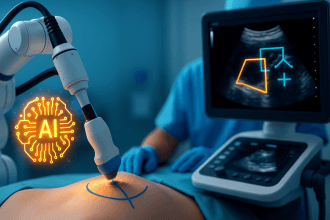In an unprecedented collaboration, NASA and Google have joined forces to revolutionize healthcare in space with the development of an AI-powered medical assistant. Designed to address the unique challenges of remote medical care in space, this innovation aims to enhance health monitoring and treatment for astronauts on long-duration missions. By combining NASA’s deep space exploration expertise with Google’s cutting-edge artificial intelligence (AI) technology, this breakthrough could set new standards for remote healthcare both in space and on Earth.
A Stellar Collaboration: Bridging Technology and Medicine
The idea of using AI for medical assistance in space stemmed from NASA’s longstanding challenge of ensuring astronaut health on missions that extend far beyond the reach of traditional medical help. With missions to Mars and other deep-space targets on the horizon, the need for reliable, autonomous medical systems has never been more critical. Google’s prowess in AI offers a promising solution to this problem.
Google’s AI team, renowned for innovations in natural language processing and machine learning, began exploring potential applications for AI in healthcare. NASA, seeking sophisticated tools that can autonomously monitor and respond to medical scenarios, found an ideal partner in Google. The collaboration intends to create a system that not only diagnoses health issues but also suggests interventions at par with a human medical professional.
Pioneering AI Technology: How It Works
The partnership leverages Google’s AI capabilities to develop a robust, adaptable health monitoring system. This AI medical assistant is being trained using vast datasets that encompass a variety of medical conditions and scenarios astronauts might encounter. Employing advanced machine learning techniques, the AI can analyze biometric data from astronauts in real-time, recognize anomalies, and propose treatments.
In a statement about the project, Dr. Emily Carter, Director of NASA’s Human Research Program, remarked, Our goal is to make sure that every astronaut has a virtual healthcare provider onboard, ready to step in during emergencies. This AI system represents a significant step toward autonomous healthcare solutions for long-duration missions.
Implications for the Healthcare Industry
The implications of this development extend beyond the boundaries of space. As AI technologies become more sophisticated, their potential applications in remote and underserved areas on Earth are significant. In rural or resource-limited settings, an AI medical assistant could offer a critical lifeline by providing medical diagnostics and guidance when healthcare professionals are not immediately available.
Healthcare experts believe that advancements derived from this space endeavor could enhance telehealth services, offering patients expert insights from afar. The use of such an AI system could be particularly transformative in managing chronic conditions and providing continuous health monitoring for patients with limited access to healthcare facilities.
Dr. Anita Gupta, a leading AI researcher in healthcare, noted, The advancements we achieve through this collaboration can redefine how medical care is delivered in remote and inaccessible areas. It’s about democratizing healthcare access globally, which aligns perfectly with the goals we’re seeing in the telemedicine field right now.
Looking Ahead: The Future of AI in Space and Earthly Healthcare
Though still in the development phase, the AI medical assistant is charting a promising path forward. The success of NASA and Google’s project could pave the way for future AI-driven innovations, both in clinical settings and beyond.
As space missions grow more ambitious, ensuring astronaut safety through innovative healthcare solutions remains paramount. This AI system not only symbolizes progress in the field of space medicine but also serves as a beacon for AI’s potential to enhance and transform global healthcare delivery systems.
The collaboration between NASA and Google marks the dawn of a new era where advanced technology and human ingenuity converge to tackle remote healthcare challenges. With continued research and development, this initiative could soon lead to breakthroughs that transform how we perceive and administer care—whether on Earth or millions of miles away in space’s enigmatic expanse.







